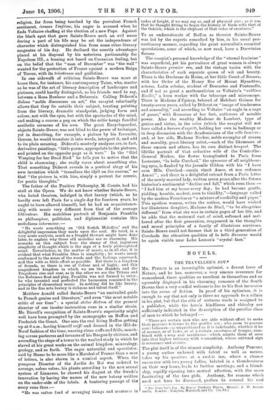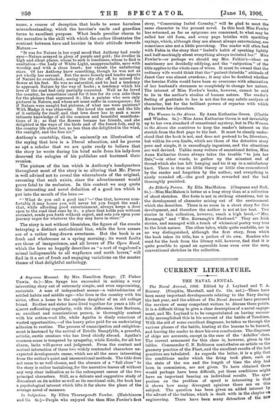NOVELS.
THE TRAVELLER'S JOY.* Ma. PIERCE is an incorrigible optimist, a devout lover of
Nature, and he has, moreover, a very sincere reverence for womanhood, three qualities so excellent in themselves and so agreeably displayed in his charming romance of the South Downs that a very cordial welcome is due to his first incursion into the arena of fiction. In proof of his optimism, it is enough to say that not only ie there no approach to a villain in his plot, but that the role of virtuous uncle is assigned to a publisher, while the hero's kindliness and chivalry are sufficiently indicated in the de scription of the peculiar class of men to which he belonged :—
" There are certain mon who are able without effort to make their presence welcome to the gentler sex ; who seem to possess some taiiS:113a—aS unquestioned as it is indefinable, whether it be of nrinuer, or of looks, or of a certain sweetness of temper, com- bined with a very real manliness—which admits them at once into that higher intimacy with womankind, whose outward sign is reverence and service.
The plot itself is of the utmost simplicity. Anthony Penrose, a young author endowed with talent as well as means, takes up his quarters at a rust ic inn, where a chance encounter with two young ladies, belated in a thunderstorm on their way home, leads to further meetings, and a friend- ship, rapidly ripening into mutual affection, with the more fascinating of the two girls. Anthony, for reasons which need not here be discussed, prefers to conceal hie real
• Mg Trawler's Jay. By Emus: Frederic Pierce. Bristol : J. W. Arrow- smith. L elloa Simpkiu. Blarsholl, and Co. [3s. 8d.]
name, a course of deception that leads to some harmless misunderstanding, which the heroine's uncle and guardian turns to excellent purpose. What lends peculiar charm to the narrative is the skill with which the author illustrates the contrast between hero and heroine in their attitude towards Nature :—
"It was for Nature in her royal mood that Anthony had ready eyes—Nature arrayed in glory of purple and gold; the dweller in high and silent places, whom to seek is loneliness, whom to find is exaltation—the Lady of White Light, unapproachable, save with worship and with a clean heart; her vassals the unfaltering stars. Of her Anthony knew something, though he was not as yet wholly her servant. But the more homely and tender aspects of Nature he overlooked; seeing the sky afar off, he missed the flower at his feet. He was no naturalist, and he had a tendency to approach Nature by the way of books ; a tendency which his love of the road had only partially corrected. Well as he loved the country, he sometimes cared for it less for its own sake than for the phrases that expressed it ; like a painter who sees only pictures in Nature, and whose art must suffer in consequence ; for if Nature were naught but pictures, of what use were painters? With Madge it was otherwise. She loved the earth and the life of it entirely for itself, and that love drew her to seek a more intimate knowledge of all the common and beautiful manifesta- tions of it ; so that the flowers became her friends, and she delighted in the ways of the birds and of the forest folk, and in the country life about her, no less than she delighted in the wind, the sunlight, and the free air."
Anthony's courtship, then, is eminently an illustration of the saying that love is a liberal education, and he proves so apt a scholar that we are quite ready to believe that the story he wrote during his brief exile from his lady-love deserved the eulogies of his publisher and hastened their reunion.
The picture of the inn which is Anthony's headquarters throughout most of the story is so alluring that Mr. Pierce is well advised not to reveal the whereabouts of the original, assuming that such exists, since the advertisement would prove fatal to its seclusion. In this context we may quote the interesting and novel definition of a good inn which is put into the mouth of the hero :—
"'What do you call a good inn?' One that, however com- fortably it may house you, will never let you forget the road ; that, while affording good entertainment, always keeps a door open to the road that runs by it; a place that holds you without restraint, sends you forth without regret, and sets you upon your journey eager for whatever the day may have in store."
The story is not without blemishes, the figure of the curate betraying a distinct anti-clerical bias, while the love scenes are of a rather long-drawn sweetness. But the book is as fresh and wholesome as a spring morning; its worst faults
are those of inexperience, and all lovers of The Open Road, which the hero so happily describes as "a sort of vagabond's missal indispensable to all wayfarers and earth lovers," will find in it a set of fresh and engaging variations on the master
theme of that delightful anthology.











































 Previous page
Previous page